Writing in Years 1 to 6
Writing in Years 1 to 6
Here at Two Gates we are fantastic writers! We use our inspirational texts to develop our writing and use different author’s styles to influence our own. We teach a range of genres (such as story writing, instructions, information texts and letters to name a few) linked to a variety of text types including fiction, non-fiction and poetry in order to make our writing varied and interesting.
English Intent
At Two Gates we provide a progressive text based English curriculum that incorporates reading into writing to ensure that our children as readers impacts upon our children as writers. Texts are carefully chosen for each year group to ensure they match pupil abilities and are progressive across year groups. Where possible, these English texts are chosen to also align themselves with wider learning across the curriculum.
Please follow this link to see which genres of writing we teach in each year group
The Teaching of writing at Two Gates
Our writing lessons are carefully planned by our teachers using the following approach:
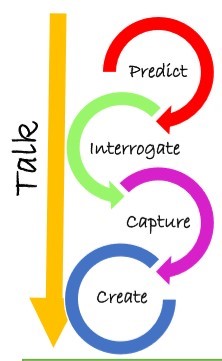
This means that first of all we make ‘predictions’ about our inspirational class text. We explore what the text type could be about, draw upon our prior knowledge and use this to help us. Next we ‘interrogate’ our text or section of our text. This involves finding out as much about the text as we need to in order to ensure we understand it and its context enough to be able to later apply these features in our own writing. We also learn new features, new year group spellings, interesting and varied vocabulary and new grammar techniques at this point, which are carefully chosen by our teachers from our progressive year group writing overviews. Our teachers will also look back and ensure we are not moving on without addressing any gaps in our learning as well as challenging us with clear next steps. We use retrieval activities through questioning or through quizzes or short tasks to remember what we have already learnt and embed it in our long term memory.
Next, we find and ‘capture’ elements of the text’s style or language that is suitable for the writing we will be doing. All the time we keep the audience and the purpose of writing in our minds. We adapt our inspirational text, draw upon model texts and use what we have found through our research or wider learning in our own writing. We also look at an author’s style and replicate it, where appropriate, in our own writing.
Lastly, we ‘create’ our own piece of writing, looking back at our learning journey to help us. We carefully plan our ideas and then we write our own piece of writing, drawing upon all we have learnt. Lastly we edit our work independently and collaboratively to make additions and improvements, check our spelling and grammar and reflect upon our writing before publishing our work for its purpose or for others to read.
Our teachers ensure that our writing lessons across school are consistent by following our very own writing rubric. This ensures every lesson is purposeful and directional. Teachers draw upon the latest research and have referenced the OfSTED ‘Telling the story: the English education subject report’, the OfSTED ‘Research Review Series’ and the EEF ‘Simple View of Writing’ to make sure all our lessons draw upon the latest research.
What our pupils say about writing:
“I love writing because I get to use my imagination.” Year 4
“Writing helps me to express myself.” Year 6
“Writing is fun. I like writing stories.” Year 1
What you can do to help:
At home you can support with your child’s writing by looking for opportunities for them to write. Could they help write your shopping list? Or a postcard from your holiday? Do they have a friend or relative they can write to? Or maybe they would like to enter one of our writing competitions? (Look out for these and other writing homework opportunities on your child’s homework tab on Showbie and look out for competitions to enter on Class Dojo – log-ins available from the school office).

Oracy – Voice 21
Throughout all our lessons, talk is an integral part of our learning, not only in English lessons but throughout the whole curriculum – cognitively, socially and linguistically. Here at Two Gates we follow the Voice 21 Oracy approach to talk (a national charity that exists to enable teachers and schools to provide a high quality oracy education so that all our young people can find their voice for success in school life). We use discussion strategies such as ‘agree’, ‘disagree’ and ‘build upon’ to develop class talk and teachers plan in activities to develop effective class discussions.
We want to develop effective communication skills for the here and now and also in readiness for later life.
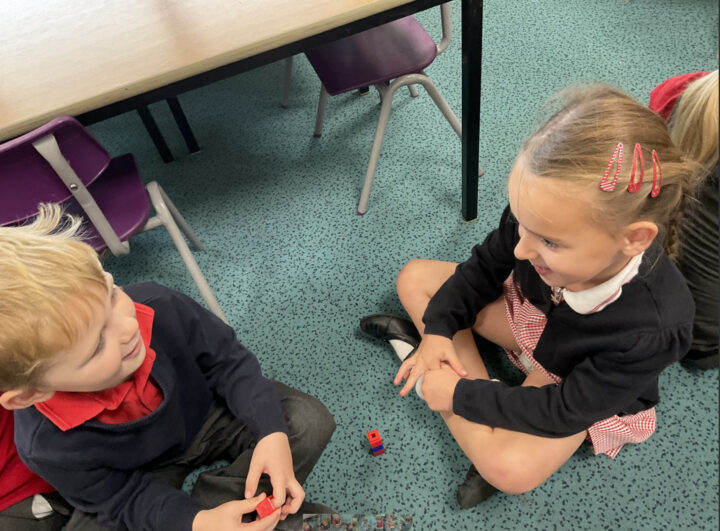
Year 1 pupils using ‘talking towers’ – talking to the person opposite and then moving down the line.
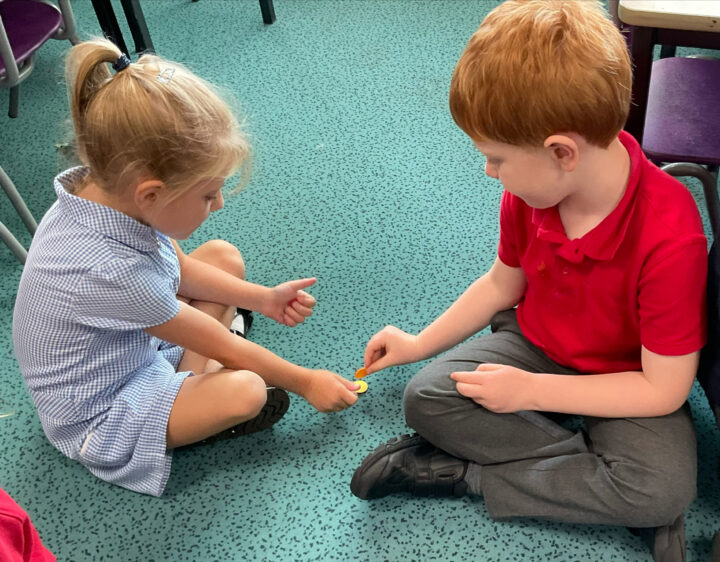
Year 1 pupils using ‘talk tokens’ to make sure they all contribute equally to a discussion.
Oracy framework
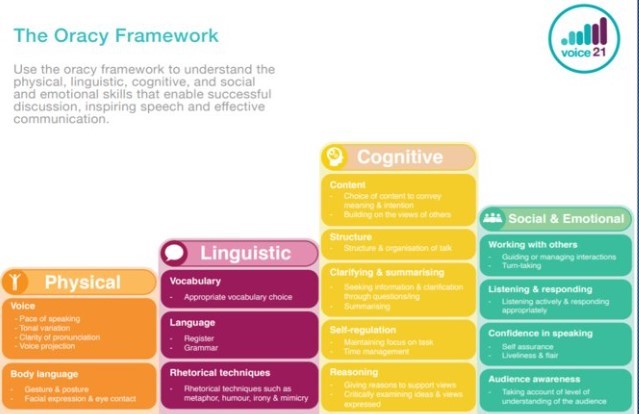
Handwriting
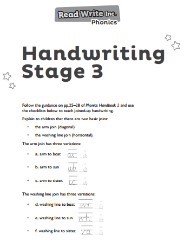
Writing is an important lifelong skill which enables us to express ourselves. Handwriting develops as children gain increasing control over their bodies and a desire to communicate through mark making. At Two Gates School, we follow the Read, Write Inc handwriting scheme and we use the Kaligo app on our iPads to embed and practice what we have learnt.
In our Early Years Foundation Stage, we offer activities which encourage children to develop controlled movements through all kinds of play and cross-curricular opportunities, such as large paint brushes on outside walls, chunky crayons, dough, threading and puzzles. Children are allowed to pick up the writing implement themselves and decide which hand they prefer. They are encouraged and supported to hold the pencil between the thumb and forefinger with the pencil resting on the third finger, this ‘tripod grip’. Correct letter formation is taught and follows the Read, Write Inc handwriting scheme.
By the end of Year 2, it is expected that the majority of pupils will write legibly using the tripod grip. We teach pupils to form their letters correctly and place them on the writing line with appropriate spaces between letters and words. We teach that ascenders (tall letters- b, d, f, h, k, l, t) should touch the top line. Any children with fine motor co-ordination difficulties will be identified and interventions put in place. Pencil grips or triangular pencils may be suggested to aid correct grip or pencil pressure. Joining is taught from Year 2 Summer term for pupils working at the greater depth standard in handwriting, following the Stage 3 handwriting scheme.
At the start of Year 3, all pupils other than other those with significant need, begin to learn to join in handwriting lessons. Those children not yet at this standard, continue to focus on correct letter formation with ascenders and descenders (descenders are letters which fall below the writing line- g, j, p, q, y) touching the correct line. Children will continue to use pencil until successfully assessed against the pen pass criteria.
In Year 4 pupils work towards attaining their ‘pen pass’ (a certificate awarded to pupils that allows them to write in school handwriting pen if they meet the criteria).
Handwriting – Year 4

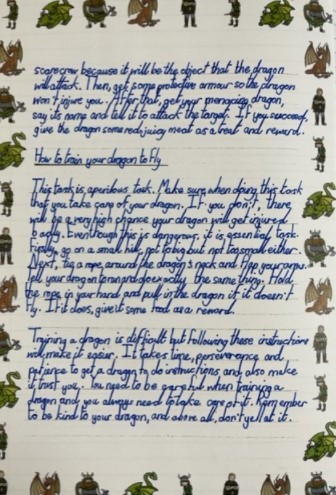
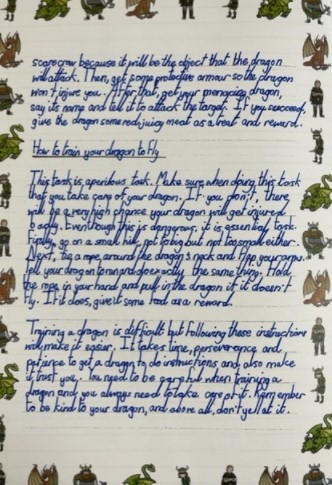

Spelling
Here at Two Gates we follow Read, Write Inc Spelling from Year 2 to Year 6. Read Write Inc Spelling is a spelling programme based on proven strategies of teacher modelling followed by partner work, to embed learning. The programme covers all the National Curriculum word structures and spelling requirements. Year group spelling words are also identified in each unit of writing and taught and applied in context to ensure pupils can use appropriately and spell them accurately.

It is built around a series of short, progressive activities and uses individual and partner work to help children learn effectively and recall what they have learnt.
Spelling rules are introduced by characters from an online spelling planet. Children spell new words and have plenty of practice in spelling them, including exception words and homophones. Read Write Inc. Spelling builds on from the the teaching in Read Write Inc Phonics. (To find out more about our phonics, please see the Reading page of our website).
How a unit works:
- Speed Spell (test)
- Spelling Zone (online introduction of next unit)
- Dots and Dashes (graphemes)
- Rapid Recap u Word Changers (root words prefix/suffix)
- Words to Log and Learn
- Dictation (practice in context)
- Four-in-a-row (recall)
- Choose the right word (word families)
- Team Teach (review and revise)
How you can help at home:
You can make a difference by helping your child to learn their weekly spellings. These will be a mixture of taught spelling rules and year group spelling words. See the images below of our year group spelling words.
Please follow this link to the year group spelling lists and also to the year group spelling rules to see what your child will be learning:
The national curriculum in England – English Appendix 1: Spelling (publishing.service.gov.uk)
Writing assessment
Teachers assess writing formatively in lessons, giving in the moment feedback and through marking. Progress towards meeting taught objectives is continually assessed by teachers. Teachers then assess a pupil’s progress against year group objectives. Writing is moderated termly alongside other staff in school as well as through external moderation dates across our academy trust, in every year group, throughout the year. The local authority also externally moderates writing every few years.
